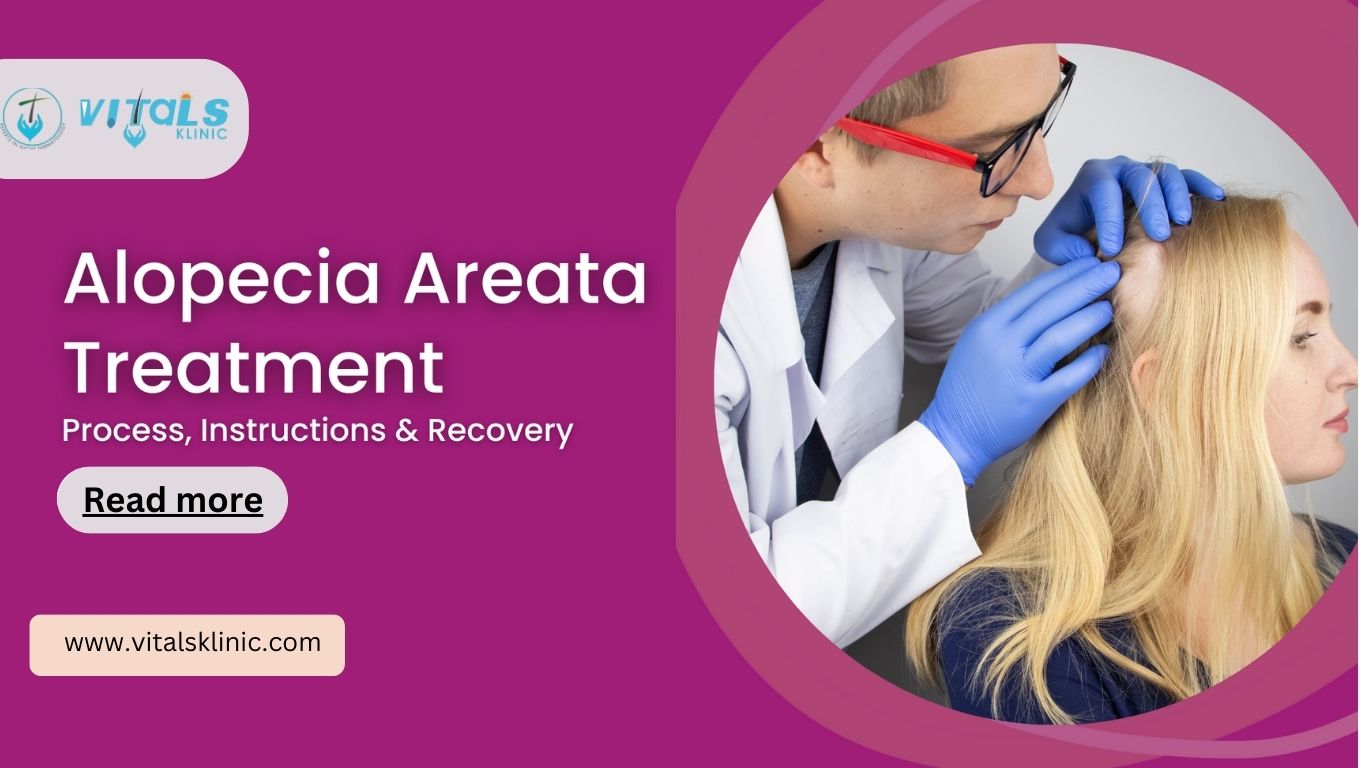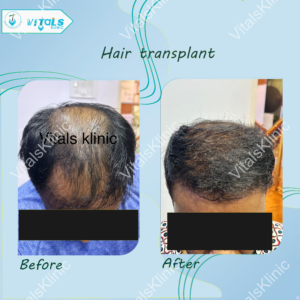
PRP vs Hair Transplant: Which Is Better for You?
PRP vs Hair Transplant: Differences, Benefits, and Best Option for You Hair loss is a concern that affects both men and
Date :21-Feb-2024

Are you losing more hair than usual? Experiencing thinning patches or bald spots? If so, you’re not alone. Hair loss affects millions of people worldwide, causing distress and affecting self-esteem. While many may attribute hair loss to genetic factors or aging, numerous other underlying causes may be responsible for your alopecia or hair thinning. Understanding the root causes of hair loss is essential to finding effective solutions and regaining your confidence.
Severe hair loss can be attributed to various factors, including hormonal imbalances, pregnancy, medication, autoimmune diseases, physical trauma, stress, nutrient deficiency and external triggers. It is important to note that hair loss is a complex issue, and its causes can vary from person to person.
It is essential to consult our expert dermatologist at vitals skin and hair clinic in Bangalore to determine the underlying cause and develop an individualized treatment plan. let’s explore the 8 major causes of severe hair loss and baldness, and how timely treatment can help you restore healthy hair growth.
Hormonal imbalances can have a significant impact on hair health and can contribute to hair loss. Two specific hormonal factors that are commonly associated with hair loss are excess androgen and underactive thyroid. Excess androgen, which is a male sex hormone, can lead to a condition called androgenetic alopecia. This type of hair loss is also called as male pattern baldness. It is characterized by a gradual thinning of the hair on the scalp, starting at the temples and crown. In women, this condition can cause overall thinning of the hair. Another hormonal factor that can contribute to hair loss is an underactive thyroid, also known as hypothyroidism. The thyroid gland will produce hormones that regulate metabolism and growth. When the thyroid gland is not functioning properly, it can disrupt the hair growth cycle, leading to hair loss.
During pregnancy, many women experience a variety of hormonal changes that can have an impact on their overall health, including their hair. One common issue that some pregnant women face is temporary hair loss. Throughout pregnancy, a woman’s body goes through significant hormonal shifts, especially an increase in estrogen levels. This surge in estrogen can prolong the hair’s growth cycle, leading to less shedding and thicker hair during pregnancy. However, after giving birth, hormone levels drastically drop, which can trigger a condition known as postpartum hair loss. This phenomenon, also known as telogen effluvium, is temporary and typically occurs two to four months after delivery. The sudden shift in hormone levels can cause a large number of hair follicles to enter the resting phase at the same time, resulting in increased shedding and noticeable thinning of the hair. It’s important to note that this type of hair loss is usually not a cause for concern and tends to resolve on its own after childbirth.
Hair loss can be a distressing side effect of certain medications. Understanding the types of medications that can contribute to hair loss is crucial for individuals experiencing this issue. Here, we will discuss some common medications known to cause hair loss:
It is important to note that not everyone who takes these medications will experience hair loss. If you are concerned about hair loss, it is best to consult with our expert dermatologist at vitals skin and hair clinic in Bangalore.
Hair loss can be caused by various autoimmune diseases like alopecia areata, lupus, hashimoto’s thyroiditis and celiac disease, in which the body’s immune system mistakenly attacks its own cells and tissues. These conditions can have an impact on the hair follicles, leading to severe hair loss.
Physical trauma, such as severe accidents or injuries, can have a significant impact on the health of your hair. When the body experiences trauma, whether it be from a car accident, a fall, or other types of injury, it can disrupt the normal hair growth cycle. One common form of hair loss associated with trauma is called telogen effluvium. This condition occurs when a significant amount of your hair follicles prematurely enter the resting phase of the hair growth cycle, known as the telogen phase. As a result, more hairs than usual will shed during the telogen phase, leading to noticeable hair thinning or even bald patches.
Stress is a common factor that can contribute to hair loss and thinning. The relationship between stress and hair loss is complex, involving both physical and emotional components. Whether it’s due to serious physical stress, such as a severe illness or surgery, or emotional trauma, the effects on the hair follicles can be significant.
Ensuring a well-balanced diet that includes these vital nutrients is essential for promoting hair growth and preventing severe hair loss due to nutrient deficiencies.
External triggers like excessive styling, heat, and chemical treatments can have detrimental effects on hair health and lead to hair loss. While these practices may temporarily enhance appearance, they can cause significant damage to the hair follicles and weaken hair strands over time. Taking preventive measures and adopting a less damaging approach to hair care is crucial in maintaining healthy hair and minimizing the risk of hair loss.
If you notice increased hair shedding after starting a new medication, consult your doctor and a hair specialist at Vitalsklinic for a safe and effective management plan.
Whether your hair loss is due to genetics, stress, or medical causes, early intervention makes a huge difference. At Vitalsklinic, our team of expert dermatologists offers advanced, evidence-based hair restoration treatments designed to stop hair fall, stimulate regrowth, and restore your natural hair density.
Here’s a closer look at the treatments we provide:
PRP Therapy is one of the most popular non-surgical treatments for hair regrowth. It involves drawing a small amount of your blood, processing it to extract platelet-rich plasma, and then injecting it into the scalp.
The plasma is rich in growth factors that help stimulate inactive or weak hair follicles, improve blood circulation, and enhance natural hair growth.
Benefits of PRP Therapy:
Strengthens existing hair follicles
Reduces hair fall
Promotes new hair growth naturally
No downtime or surgery required
At Vitalsklinic, PRP sessions are customized based on your scalp condition to ensure visible and long-lasting results.
Mesotherapy is a technique that nourishes and rejuvenates the scalp by injecting a combination of vitamins, amino acids, and natural extracts directly into the hair roots.
This improves blood circulation, corrects nutritional deficiencies, and stimulates faster hair growth.
Benefits of Mesotherapy:
Improves hair density and volume
Reduces dandruff and scalp inflammation
Restores hair shine and strength
Safe and effective for both men and women
At Vitalsklinic, our dermatologists use clinically tested solutions to ensure safe, painless, and effective mesotherapy sessions.
Low-Level Laser Therapy, also known as cold laser therapy, uses gentle, red-light energy to stimulate hair follicles at the cellular level.
This non-invasive treatment increases ATP (cellular energy) in scalp cells, promoting stronger and thicker hair growth.
Benefits of LLLT:
Encourages active hair growth phase (anagen phase)
Strengthens hair roots
Improves scalp circulation
Completely painless and non-surgical
LLLT at Vitalsklinic is performed using advanced FDA-approved devices that are safe for all hair types.
For individuals with advanced hair loss or baldness, a Hair Transplant is a permanent and highly effective solution.
At Vitalsklinic, we offer two modern transplant techniques:
FUE (Follicular Unit Extraction): Individual hair follicles are extracted from the donor area (usually the back of the scalp) and implanted into the bald areas.
FUT (Follicular Unit Transplantation): A small strip of scalp is removed, and hair follicles are separated and transplanted.
Benefits of Hair Transplant:
Permanent, natural-looking results
Quick recovery and minimal scarring (especially with FUE)
Suitable for both men and women
Our experienced transplant specialists at Vitalsklinic use precise grafting methods to ensure natural hairline design and long-lasting density.
In many cases, hair loss is related to internal health issues, stress, or poor nutrition. Our Medical and Nutritional Hair Regrowth Programs focus on treating the underlying cause of hair thinning.
These programs include:
Doctor-prescribed medications such as Minoxidil or Finasteride (where appropriate)
Customized diet and supplement plans rich in iron, biotin, and vitamins
Scalp care treatments to improve follicle health
Benefits of these programs:
Targets internal and external causes of hair loss
Improves overall scalp and hair health
Works well in combination with PRP or Mesotherapy
Our dermatologists monitor your progress closely and adjust the plan to ensure optimal results.
Experienced dermatologists and hair restoration specialists
Personalized, science-backed treatment plans
Advanced, FDA-approved technology and sterile clinical setup
Visible results with a natural finish
Regain your confidence with thicker, healthier hair.
Book your personalized hair restoration consultation today at Vitalsklinic and take the first step towards a confident new you!

PRP vs Hair Transplant: Differences, Benefits, and Best Option for You Hair loss is a concern that affects both men and

10 Essential Questions You Should Ask Before a Hair Transplant When considering a hair transplant, it’s natural to feel both excited

ACNE vs PURGING – Vital Differences You Must Know to Save Your Skin You just started a new skincare routine and